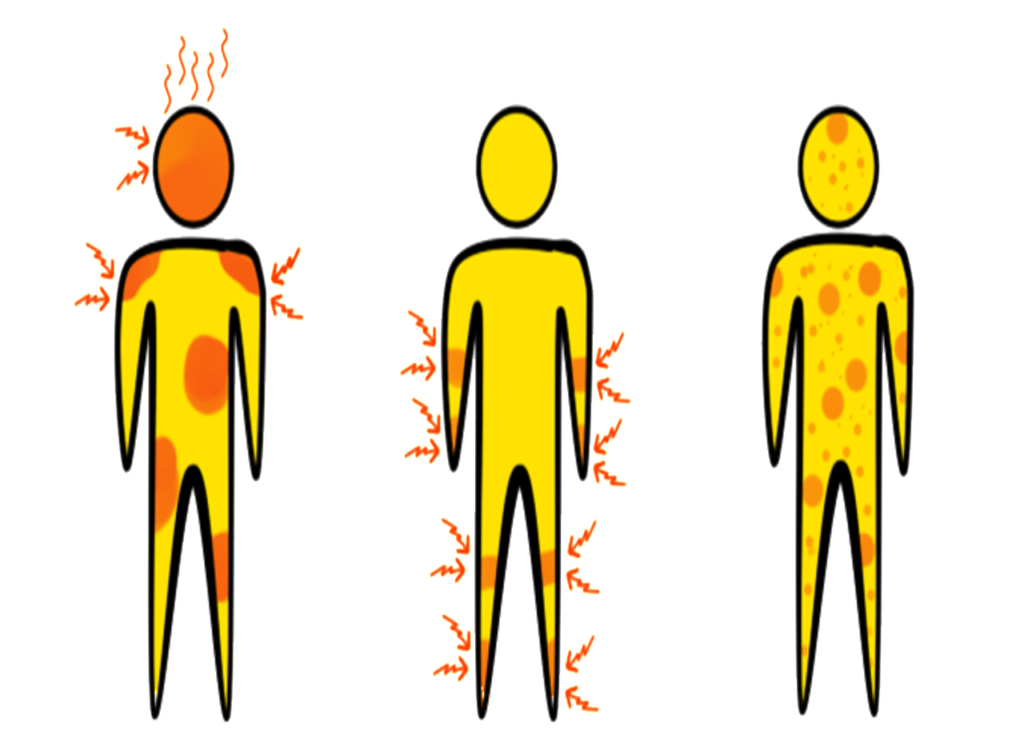Are you feeling tired, gaining weight, or experiencing mood swings? If so, you might be dealing with symptoms of a thyroid disorder. In this article, we will walk you through the common signs and symptoms of thyroid issues, helping you understand what your body might be trying to tell you. Let’s break it down together!

This image is property of pixabay.com.
Check out our Product Reviews
What is the Thyroid Gland?
Let’s start with the basics – your thyroid gland. This small, butterfly-shaped gland located in your throat plays a crucial role in regulating your body’s metabolism. The hormones produced by the thyroid gland control vital functions like heart rate, body temperature, and energy levels.
Thyroid Hormones
Your thyroid gland produces two main hormones – T3 (triiodothyronine) and T4 (thyroxine). These hormones are responsible for regulating your metabolism and energy levels. When your thyroid is not functioning properly, it can lead to an imbalance in these hormones, resulting in various symptoms.
Types of Thyroid Disorders
There are several types of thyroid disorders, each with its own set of symptoms and causes. The most common types of thyroid disorders include:
Hypothyroidism
Hypothyroidism occurs when your thyroid gland does not produce enough hormones to meet your body’s needs. This can slow down your metabolism, leading to symptoms like fatigue, weight gain, and sensitivity to cold.
Hyperthyroidism
Hyperthyroidism, on the other hand, happens when your thyroid gland produces an excessive amount of hormones. This can speed up your metabolism, causing symptoms like weight loss, nervousness, and rapid heart rate.
Thyroid Nodules
Thyroid nodules are lumps that develop in the thyroid gland. While most nodules are benign, some can be cancerous. Symptoms of thyroid nodules can vary depending on their size and location.
Check out our Product Reviews
Common Symptoms of Thyroid Disorders
Now that we have covered the basics let’s dive into the common symptoms of thyroid disorders. Keep in mind that these symptoms can vary from person to person, and not everyone will experience all of them. Here are some of the most common signs to look out for:
Fatigue
Feeling excessively tired despite getting enough rest is a common symptom of thyroid disorders, especially hypothyroidism. Your body’s metabolism is directly linked to your energy levels, so changes in thyroid hormone levels can leave you feeling drained.
Weight Changes
Unexplained weight gain or weight loss can be a sign of a thyroid disorder. In hypothyroidism, your metabolism slows down, making it easier to gain weight. On the other hand, hyperthyroidism speeds up your metabolism, causing unintended weight loss.
Mood Swings
Thyroid disorders can impact your mood and emotions. You may experience feelings of depression, anxiety, irritability, or mood swings. These changes in mood can be caused by hormonal imbalances affecting your brain chemistry.
Changes in Heart Rate
Your thyroid hormones play a role in regulating your heart rate and rhythm. An overactive thyroid can cause a rapid heart rate, palpitations, or irregular heartbeat. Conversely, an underactive thyroid can lead to a slow heart rate or other cardiac issues.
Sensitivity to Temperature
Thyroid disorders can also affect how your body regulates temperature. People with hypothyroidism may feel cold all the time, while those with hyperthyroidism tend to feel hot or sweaty. Your body’s ability to regulate heat is closely tied to your thyroid function.
Hair Loss
Changes in thyroid hormone levels can impact hair growth and texture. People with thyroid disorders may experience hair loss or thinning, dry and brittle hair, or changes in hair texture. These changes are often reversible with proper treatment.
Skin Changes
Thyroid disorders can affect the health of your skin. Dry, itchy skin, or changes in texture are common symptoms of thyroid imbalances. In some cases, skin conditions like eczema or psoriasis can worsen with untreated thyroid disorders.
Muscle Weakness
Muscle weakness and aches can be a sign of thyroid dysfunction, especially hypothyroidism. Your muscles rely on thyroid hormones to function properly, so an imbalance can lead to weakness, cramps, or pain. Improving thyroid function can help alleviate these symptoms.
Changes in Bowel Habits
Thyroid disorders can also impact your digestive system, leading to changes in bowel habits. Constipation is a common symptom of hypothyroidism, while diarrhea or frequent bowel movements can be seen in hyperthyroidism. Keeping track of these changes can help your healthcare provider diagnose your condition.
When to See a Doctor
If you are experiencing any of the symptoms mentioned above, it’s essential to consult with your healthcare provider. A simple blood test can help determine if your thyroid gland is functioning properly. Early detection and treatment of thyroid disorders can prevent complications and improve your quality of life.
How to Prepare for Your Appointment
Before seeing your doctor, make a list of your symptoms, including when they started and how they are affecting your daily life. Bring any relevant medical history and a list of medications you are currently taking. Being prepared will help your healthcare provider make an accurate diagnosis.
Common Tests for Thyroid Disorders
Your doctor may order several tests to evaluate your thyroid function. These tests can include:
- TSH (Thyroid-Stimulating Hormone) Test: Measures the levels of TSH in your blood, which helps assess thyroid function.
- T4 Test: Checks the levels of the thyroid hormone T4 in your blood. Abnormal levels can indicate hyperthyroidism or hypothyroidism.
- T3 Test: Measures the levels of the thyroid hormone T3 in your blood. This test can help diagnose hyperthyroidism.
- Thyroid Ultrasound: Uses sound waves to create images of your thyroid gland, helping identify any nodules or abnormalities.
Treatment Options for Thyroid Disorders
The treatment for thyroid disorders will depend on the type and severity of your condition. Here are some common treatment options:
- Medications: Thyroid hormone replacement therapy is often prescribed for hypothyroidism to restore hormone levels in the body. Anti-thyroid medications can be used to manage hyperthyroidism.
- Radioactive Iodine Therapy: A common treatment for hyperthyroidism, this therapy involves taking radioactive iodine to destroy overactive thyroid cells.
- Surgery: In some cases, surgery may be necessary to remove part or all of the thyroid gland. This can be done to treat thyroid nodules or cancers.
- Lifestyle Changes: Eating a balanced diet, getting regular exercise, and managing stress can help support thyroid health and overall wellness.
Monitoring Your Thyroid Health
Once you have been diagnosed with a thyroid disorder, it’s essential to monitor your thyroid function regularly. Your doctor may recommend follow-up appointments and blood tests to assess hormone levels and adjust your treatment plan as needed. Keeping track of your symptoms and how you are feeling can also help you and your healthcare provider manage your condition effectively.

This image is property of pixabay.com.
Conclusion
Understanding the symptoms of thyroid disorders is the first step in taking control of your health. By recognizing the signs early and seeking appropriate medical care, you can manage your condition and improve your quality of life. Remember, you are not alone in this journey. Your healthcare provider is there to support you and guide you towards better thyroid health. Take charge of your wellness and listen to what your body is trying to tell you. It’s time to prioritize your thyroid health and overall well-being.
Check out our Product Reviews